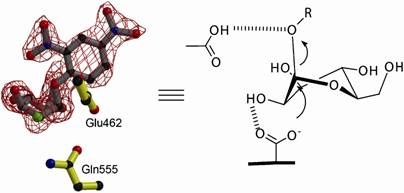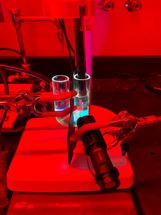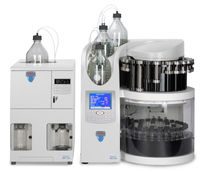New technology for safer solvents
Pioneering research into ionic liquids at University of Leicester
A new facility that will revolutionise the industrial processes of electropolishing, metal oxide processing and electroplating - the pioneering Ionics Liquid Demonstrator - has been launched at the University of Leicester.
The development of this multi-application pilot plant facility has been carried out by Professor Andy Abbott, Head of the University's Department of Chemistry and Director of the University spin-out company, Scionix, in collaboration with the Leicester Shire Economic Partnership (LSEP).
The Ionic Liquids Demonstrator (ILD) project builds on the historic and ongoing research and development activities in the Green Chemistry group at the University of Leicester to transfer its ionic liquids applications know-how to Leicestershire business.
Ionic liquids are fluid at ambient temperatures. They have several advantages over conventional molecular solvents, making them a viable environmentally-compatible alternative to traditional solvents. Ionic liquids have physical properties that make them very interesting as potential solvents for synthesis.
The University of Leicester has established a multi-application pilot plant facility at University offering a range of small-scale process demonstrations in the practical application of ionic liquids to metal-related industrial processes.
The Leicester ionic liquid applications have real potential to bring new value-added gains to existing businesses within the sub-region.
As an environmentally friendly, non-toxic substitute for current processes, their use would create both health and safety and environmental benefits, in addition to competitive product advantage achieved through better tailoring of product characteristics (hardness, fineness, adherence, etc.).
By removing harsh acid-based processes, ionic liquid applications improve energy efficiency and decrease the emission of chemicals to the environment.
The project will work with local businesses to encourage end-users to explore and evaluate, in a tangible way, the benefits of industrial processes based on ionic liquids.
Most of the solvents Scionix has developed are based on vitamin B4 (choline chloride), which is safe and easy to manufacture in large quantities. Its use does not have to be registered. By combining the basic liquid with other molecules or salts a range of processes can be tailored to individual companies' use.
Professor Andy Abbott commented: "This is a fantastic opportunity for us to collaborate with local industry and hopefully bring new technology to expand their product ranges. Our local partnerships have so far been very successful and we would like to extend them using this unit."
Nick Carter, chairman of Prospect Leicestershire, said: "Our universities are a tremendous resource for the local economy. This initiative by the University of Leicester has the potential to help local businesses with cutting edge technology – as well as enhancing the reputation of the university nationally and internationally."
These products might interest you
See the theme worlds for related content
Topic world Synthesis
Chemical synthesis is at the heart of modern chemistry and enables the targeted production of molecules with specific properties. By combining starting materials in defined reaction conditions, chemists can create a wide range of compounds, from simple molecules to complex active ingredients.

Topic world Synthesis
Chemical synthesis is at the heart of modern chemistry and enables the targeted production of molecules with specific properties. By combining starting materials in defined reaction conditions, chemists can create a wide range of compounds, from simple molecules to complex active ingredients.































































